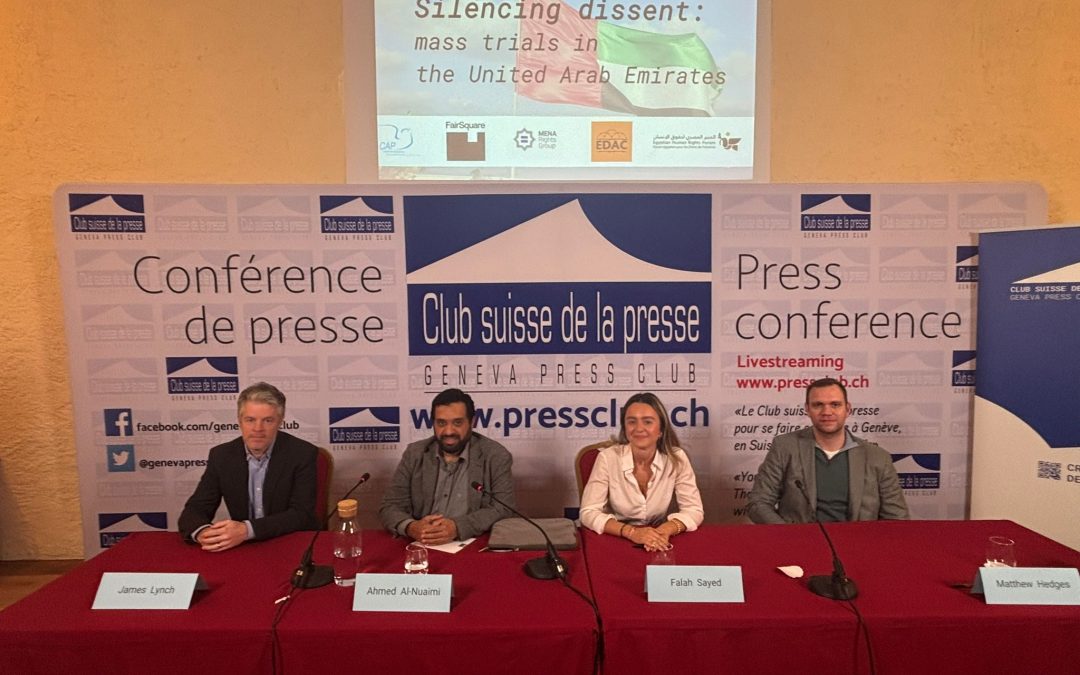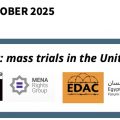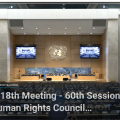Geneva, 2 October 2025 — On the occasion of the 60th session of the Human Rights Council, the Geneva Press Club hosted an event on Thursday 2 October 2025 on “Silencing dissent: mass trials in the United Arab Emirates”. The event took place only a few days after the United Nations Assistant Secretary-General for Human Rights presented the annual report on intimidation and reprisals against those cooperating with the United Nations, which highlighted concerns regarding the conduct of arbitrary arrests and mass trials in the UAE.
This important discussion was organised in collaboration with CAP Freedom of Conscience, the Emirates Detainees Advocacy Center (EDAC), MENA Rights Group and the Egyptian Human Rights Forum (EHRF) and moderated by James Lynch, Director of FairSquare. Speakers included Falah Sayed, Human Rights Officer at MENA Rights Group, Hamad Al-Shamsi, Executive Director of the Emirates Detainees Advocacy Center (EDAC), Ahmed Al-Nuaimi, exiled member of the “UAE94” trial, Moataz El-Fegiery, Co-founder and President of the Egyptian Human Rights Forum (EHRF) and Matthew Hedges, a British academic specialised in Security Studies.
In his opening remarks, Thierry Valle, President of CAP Freedom of Conscience, recalled that the organisation had hosted a similar side event at the Human Rights Council a year ago. He warned that “one year on, the situation remains deeply troubling, with information about domestic proceedings still limited,” and added that “alarmingly, repression now extends to non-UAE citizens living abroad, as the state relies on international cooperation to secure the extradition of dissidents to the UAE.”
Commenting on the current situation, James Lynch stressed that the UAE has been experiencing a human rights crisis for 15 years, which intensified in 2011 when intellectuals and political figures attempted to peacefully advocate for democratic reforms. Reflecting on his visit to the country in 2014, he recalled being struck by “the levels of fear in the UAE among citizens and foreign nationals who did not want to speak for fear of what that could mean for them”. Lynch added that the situation has since worsened, citing the repression during COP28 as a striking example. While international attention was focused on the UAE during this major global event and calls were being made for the release of arbitrarily detained individuals, including Ahmed Mansoor, the authorities responded by organising a new mass trial, known as ‘UAE87’.
Hamad Al-Shamsi, Executive Director of the Emirates Detainees Advocacy Centre (EDAC), expressed concern, explaining that he has been raising awareness about mass trials in the UAE “for so many years, at different instances, but nothing has changed”. He expressed regret that, instead of releasing individuals who were arbitrarily arrested and remain detained, new sentences were handed down in 2025. Al-Shamsi noted that, despite the UAE’s well-documented human rights record and involvement in international conflicts, foreign states continue to maintain diplomatic relations and engage with the UAE on the international stage, for instance, by hosting major events such as COP28. He argued that such an approach, rather than condemning human rights violations, provides the UAE with a platform to bolster its international image.
Commenting on the role played by the United Nations and its bodies, he believes that “we do not have an effective tool anymore”. While acknowledging that human rights reports and UN communications to the UAE are necessary, he stressed that “this is not enough”, adding that the international community must address this human rights crisis in a manner that would have a more tangible impact.
Falah Sayed, on the other hand, recalled the findings of the recent report of the UN Secretary-General, which documents intimidation and reprisals against those cooperating with the United Nations, and explicitly mentions the cases of Mohamed al-Mansoori, Ahmed Mansoor, and Ahmad Ali Mekkaoui in the UAE. The report, in particular, refers to a communication sent to the UAE by UN Special Rapporteurs who raised concerns about the rejection of an appeal, “noting that those who had previously been convicted in the so-called UAE94 case (…) were retried for the same acts”.
As highlighted by the UN Special Rapporteurs in their communication to the UAE in April 2025, the UAE’s Counter-Terrorism Law has been misused to target certain forms of criticism and dissent. The broad interpretation of this legislation has been used to arbitrarily arrest individuals, accuse them of terrorism, and conduct unfair trials. For instance, Ahmed Al-Nuaimi, now living in the United Kingdom, was sentenced in absentia to 15 years’ imprisonment due to his alleged affiliation with a group designated by the UAE as a terrorist organisation.
Sayed further explained that the UAE has used citizenship revocation as a tool of political control and punishment against dissidents, activists, and their families. She highlighted the case of Ahmed Al-Nuaimi, whose citizenship was revoked, and whose family was subjected to travel bans that prevented them from leaving the country: “Fearing arrest simply for exercising my rights to freedom of expression and association, I made the difficult decision not to return to my home country”. After two failed attempts, his family was eventually able to leave the UAE via a land border.
Turning to Moataz El-Fegiery, James Lynch noted that unfair trials primarily affect Emirati citizens and those arrested within the UAE but also highlighted the “international nature” of the repression, commonly referred to as transnational repression, a practice that “is receiving a lot of attention at the moment, and rightly so”, according to Lynch.
Moataz El-Fegiery, noted that “over the last few years, the UAE has become a major power in the Middle East and highly influential” on the international stage. He emphasised the difficulty of pressuring the UAE to release prisoners of conscience. El-Fegiery highlighted that the use of arbitrary detention extends beyond the country’s borders, citing the case of Abdulrahman Al Qaradawi, who was extradited from Lebanon to the UAE at the request of Emirati authorities. The arrest was based on a social media video in which Al Qaradawi criticised the Egyptian, Saudi, and Emirati governments. Yet he is neither an Emirati citizen nor had he committed any offence on Emirati soil. While other foreigners have also been detained in the UAE, this case is particularly alarming, as it demonstrates how state cooperation can enable unlawful arrest warrants, leading to unlawful extradition and the risk of an unfair trial.
Like the other panellists, Moataz El-Fegiery recalled that mass trials continue in the UAE despite external pressure. He highlighted the work of Mary Lawlor, UN Special Rapporteur on Human Rights Defenders, who has prioritised the UAE in her efforts and issued several urgent appeals, yet received no meaningful response from the government. In this context, El-Fegiery stressed the importance of support from the international community, including the United States and European governments, noting that such backing could have a tangible and far-reaching impact on human rights activism worldwide.
Addressing a message to the UAE, he said “The UAE should show responsibility in addressing the issues related to mass trials and emblematic cases, such as that of Abdulrahman Al Qaradawi”. At a time when little progress is visible, El-Fegiery believes that human rights advocates must demonstrate resilience and continue their peaceful struggle.
Examining the UAE’s relations with other states, Matthew Hedges explained that the country enjoys a positive reputation as the result of a “carefully built and sustained campaign of soft power, influence, and leverage”, and pointed out that many states continue to engage with the UAE despite well-documented human rights violations, both domestically and in international conflicts such as in Sudan. In particular, international human rights organisations, including Amnesty International, have documented the UAE’s role in supplying weapons to the Rapid Support Forces.
Noting that this carefully cultivated reputation has allowed the government to achieve its intended outcomes, Hedges added, however, that “it has been eroded, over the last couple of years”. James Lynch echoed this point, emphasising that media outlets such as the New York Times have recently reported on the conflict in Sudan, explicitly referencing the UAE’s direct involvement on their front page, “something we would not have seen a few years ago”.
In conclusion, all panellists agreed that the United Nations, its bodies, and international human rights organisations are crucial in identifying patterns of violations and ensuring that the UAE implements international human rights standards. Other states also have a key role to play, as their ongoing relations with the UAE give them direct access and leverage to apply diplomatic pressure. Moataz El-Fegiery emphasised that external pressure has allowed human rights organisations to secure visits to the UAE, though he stressed that this remains far from sufficient.
Adding to the discussion, Michael Khambatta, Geneva representative for the Gulf Center for Human Rights, highlighted the striking contrast between the UAE’s positive international reputation and its poor human rights record, an aspect James Lynch noted is unusual compared with other authoritarian regimes that violate fundamental rights and whose abuses are widely documented. Khambatta stated that while the country promotes, for instance, Dubai “as a playground” for international visitors, advocacy work is essential to inform the wider public about the reality. Like the speakers, he pointed out that opportunities for addressing these human rights violations are limited and highlighted the importance of identifying the factors that significantly shape the UAE’s reputation. He added that the country’s willingness to invest heavily in image-building “in fact shows some vulnerability.”






